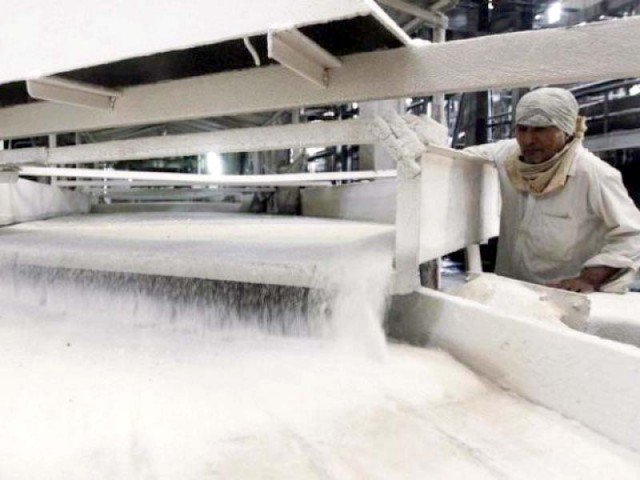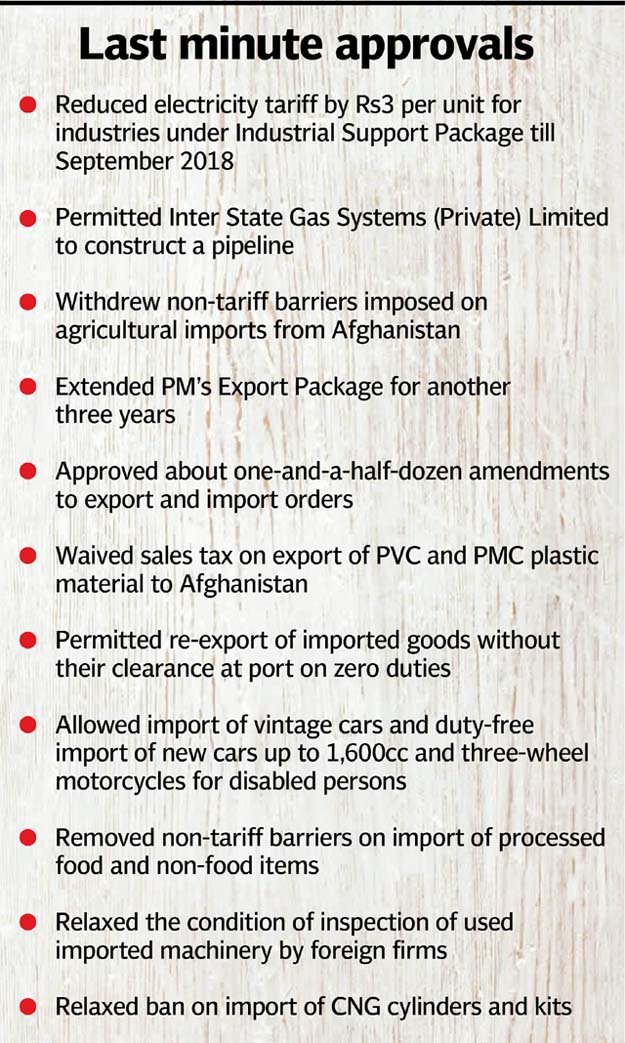ECC sanctions Rs90b relief package for export industries
ECC permanently lifts curbs on sugar exports, allows import of up to 5-year-old electric cars

The ECC met just a day before the end of the government’s term.
PHOTO: EXPRESS
The Economic Coordination Committee (ECC) of the cabinet approved sweeping changes to existing import and export regimes besides extending concessions in tax, duty drawback and electricity tariff to industrialists. The ECC met just a day before the end of the government’s term.
ECC puts off decision on higher LNG import margins
Headed by the prime minister, the ECC extended the PM’s Export Package for three more years that would cost the national exchequer Rs40 billion annually.
In addition to that, the ECC approved a Rs3-per-unit reduction in electricity tariff for industries under the Industrial Support Package till September 2018, which would cost it an additional Rs50 billion.
The ECC also permitted Inter State Gas Systems (Private) Limited to construct a pipeline connecting a liquefied natural gas (LNG) re-gasification terminal at Sonmiani, called the Bahria Foundation LNG Terminal, to Nawabshah.
ECC eases rule for oil imports to keep power plants running
The pipeline will transmit 700 to 1,200 million cubic feet per day (mmcfd) of high-pressure re-gasified LNG, which will then be transported to the country’s north. It also allowed Pakistan LNG Limited (PLL) to use the existing government’s guarantee of $150 million for issuing a letter of credit/standby letter of credit. The facility will enable PLL to procure LNG on a mid to long-term basis.
The cabinet body withdrew the non-tariff barriers imposed on agricultural imports from Afghanistan, removing a major irritant in bilateral trade. It allowed import of up to five-year-old electric cars - a ceiling that is two years higher than that for the import of other used cars.
ECC approves circular debt settlement plan
The ECC also permanently removed the restriction on sugar exports, leaving the determination of demand and supply on market forces.
Power subsidy
A committee, constituted by the ECC, submitted its report on an electricity subsidy of Rs3 per unit for industries. Against the finance ministry’s request to discontinue the subsidy from December 2017, the sub-committee called for its continuation.
The ECC also gave the go-ahead to continuing the subsidy till September 2018. The sub-committee was of the view that its discontinuation would increase electricity cost due to increase in fuel prices in the international market and depreciation of the rupee.
The financial implication of the subsidy from January to September 2018 would be Rs50 billion, the Power Division told the ECC. Its financing cost up to December 2017 was Rs31 billion.
Earlier, the government was not giving the entire subsidy of Rs3 per unit and linked tariff reduction with fuel price adjustment. But due to increase in global crude oil prices and determination of new electricity tariffs by the National Electric Power Regulatory Authority (Nepra), the finance ministry is no more in a position to withhold benefits.
Export package
The ECC extended the PM’s Export Package, which was going to expire next month, for another three years. It will have a minimum annual cost of Rs40 billion. The government has tried to appease the All Pakistan Textile Manufacturers Association (Aptma) by extending the package.
Existing five export-oriented industries and new non-textile sectors will be eligible for the package which included electric fans, electrical appliances, electricity equipment and cables, transport equipment, sports bags, leather products, fresh fruits and vegetables and dairy products.
Amendments to export, import orders
The ECC approved about one-and-a-half-dozen amendments to export and import orders. A major amendment was the lifting of restrictions on sugar exports, which would clear the glut in the market and also reduce the burden on the exchequer.
However, this may push sugar prices up in the domestic market. The ECC, however, decided that the government would no longer give subsidy on sugar exports.
The ECC allowed re-export of imported pulses for those who would add value. It also waived sales tax on the export of PVC and PMC plastic material to Afghanistan. It also gave green light to export and re-export of humanitarian goods by international humanitarian and relief organisations.
The ECC permitted re-export of imported goods without their clearance at port on zero duties. There are certain businesses that bring shipments from a third country and re-ship from Pakistani ports to foreign buyers without getting it cleared for domestic consumption.
The ECC allowed import of vintage cars, which are over 50 years old. In order to encourage usage of renewable energy and to reduce carbon emissions, the ECC allowed import of up to five-year-old electric vehicles under personal baggage, transfer of residence and gift schemes. It allowed duty-free import of new cars of up to 1,600cc and three-wheel motorcycles for disabled persons. The cabinet body removed non-tariff barriers on the import of processed food and non-food items, ending the requirement of sanitary and phytosanitary tests by the Department of Plant Protection.
In another measure, the ECC relaxed the condition of inspection of used imported machinery by foreign firms. It instead allowed the inspection at Pakistani ports by representatives of foreign firms.
The ECC decided to relax the ban on import of CNG cylinders and kits and allow authorised dealers to import them. It also reduced customs duty on imported kits and cylinders.

Published in The Express Tribune, May 31st, 2018.
Like Business on Facebook, follow @TribuneBiz on Twitter to stay informed and join in the conversation.


















COMMENTS
Comments are moderated and generally will be posted if they are on-topic and not abusive.
For more information, please see our Comments FAQ